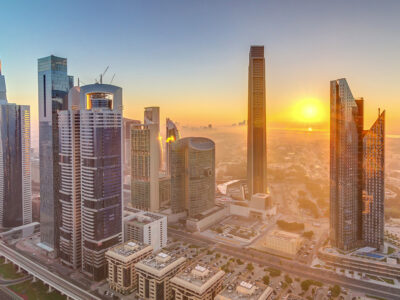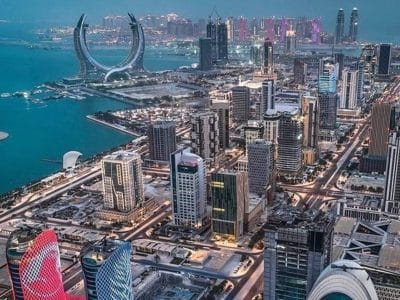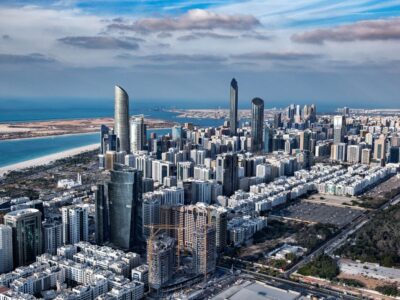Unfazed by the collapse of its planned $11bn debut in Russia and the abandoned bid to buy the UK’s Minerva, Limitless CEO Saeed Ahmed Saeed is ploughing ahead with a $110bn project pipeline and a new focus on Africa.
Saeed Ahmed Saeed says he’s not aspiring to be “the biggest investor” in the markets in which he operates. For him, what matters most is adding value to the economies of those countries, creating jobs and enhancing people’s lifestyles. And yet, he sits on a staggering $110bn worth of announced projects.
Over the past year, the CEO of Limitless, a Dubai World company, has more than doubled the company’s global projects portfolio. Its latest launches include Rasuna Epicentrum, a $1.7bn mixed-use development in Indonesia and World Island Resort, a $350m luxury hotel and villa complex in the UAE.
For us the Russian market is one of the strategic markets and we take it very seriously… we are hoping to close more deals in the near future.
GCC property companies launched $100bn worth of new projects last week at annual property show Cityscape Dubai 2008, despite a global economic slowdown which has seen regional real estate stocks tank.
The UAE market and its surrounding region is still a main focus for Limitless, affirms Saeed, despite the prevailing negative sentiment in the market.
“We believe in the solidity of the market in the GCC,” says Saeed, adding: “We all agree that there is a short-term problem [with liquidity]. There is no market that is not directly influenced, but in the GCC we are the least influenced by the current credit crunch. There are some impacts in the short term, but we still have to examine the long-term impact.”
Limitless, with 11 international offices and a presence in nine countries, is now closely examining opportunities in the African market.
“Our next move will be, hopefully, depending on the market especially with the circumstances globally, to move to Africa and Western Europe,” says Saeed.
Africa is “very important” for the company, as Limitless considers all types of projects whether township developments, tourism projects, mixed-use and waterfront. “We are measuring all the opportunities,” says Saeed.
Founded as the real estate development arm of Dubai World in mid-2005, Limitless has expanded aggressively in international markets. Starting with the GCC and the Middle East (Jordan), it later entered South East Asia with a project in Vietnam, followed by other schemes in Malaysia, Indonesia, and finally Eastern Europe with projects in Poland and Moscow.
Despite axing a planned $11bn project in Russia last year, Saeed hasn’t given up on the country. Limitless has already announced a 113-hectare development in Khimki Region, near Moscow. The project will build up to 4500 homes, schools, retail and commercial elements. It will be executed through a 50-50 joint venture with top Russian developer RDI.
Saeed insists Limitless, as a “strategic developer”, is not hindered by the current turbulence in neighbouring Georgia.
“For us the Russian market is one of the strategic markets and we take it very seriously. We have our first project, the Khimki Region and we are hoping to close more deals in the near future,” says Saeed.
Another area that remains on the company’s radar, especially for acquisitions, is Western Europe. Earlier in September, Limitless withdrew from a $474m bid to acquire London-based developer Minerva, which has been hit hard by the collapse of the subprime mortgage market.
“We could not reach an agreement as per the due diligence permissions we had with the third party. There were a few issues that could not be resolved. For us it was a deal breaker,” says Saeed.
Limitless had failed to get agreement from Minerva’s lenders for the acquisition. Getting the banks’ consent was a main condition to the deal, which failed to materialise “as a result of being unable to obtain necessary consents on terms satisfactory to Limitless”.
However, Saeed confirms this will not be the end of attempts to enter the market. “That one deal could not go through does not mean it’s the end of opportunities for us. We still remain interested in London and Western Europe and we hope that we can close a deal in the future,” he says.
“Our next move, as we have positioned ourselves firmly, will be Western Europe. London represents the heart of Western Europe for us and is going to be always on our radar.”
Closer to home, large-scale projects such as the $11bn Arabian Canal, a waterway as long as the Panama Canal, is slowly shaping up. Limitless has announced the appointment of Tristar Transport & Contracting for the first phase of earthworks on the canal.This would see the removal of more than 200 million cubic metres of earth – to be reused to form new landscapes, including valleys and hills up to 200 metres high – along a 9 km stretch of the waterway’s route.
Work on phase one has already commenced as excavation and land reforming is expected to be completed in three years. The earthworks are split into 10 different packages due to the scale of the project. Tristar will work on phase one, expected to be completed in less than three years.
“We have completed the master planning of the entire Arabian Canal part which equates to 15,000 hectares. We will be launching soon the first phase of it which is around 2000-3000 hectares,” says Saeed, adding that the project is on target to be completed within the next four to five years.
We believe in township developments. We build cities where there are no cities, and when there are no cities there’s no economy. When we build a city we create jobs and an economy.
The biggest challenges of the project are related to technical aspects and engineering, says Saeed, who believes it is the “most sophisticated civil engineering project in the world” and a highly important strategic development for Dubai and the region.
“It will add a new dimension to the development of Dubai, bringing a navigable canal into the desert,” says Saeed with a smile.
Saeed insists there are no delays to the mega-project. The tender for phase two has been issued, says Saeed, who is hoping to award the second phase before the end of the year.
“That will take care of almost half of the Arabian Canal,” he says.
Last month, Dubai issued new property and mortgage laws aimed at regulating the off-plan market.
Saeed says their impact on speculative buying is a welcome development.
“In the short term we have to accept that speculation is part of the market. We don’t have to look at it as positive or negative. It has helped the market grow to a certain extent.
“Nature taking its toll sometimes is not a bad thing because it would rationalise the market in a more acceptable way,” he says.
And it doesn’t seem to have diminished his appetite for mega-projects.
“We believe in township developments. We build cities where there are no cities, and when there are no cities there’s no economy. When we build a city we create jobs and an economy.”
UAE
Arabian Canal: $11bn, 75 km man-made waterway and $50bn, 14,000 hectare canalside city for more than 2.5 million people.
Downtown Jebel Ali: $13bn, 200-hectare mixed-use development consisting of four quarters, each with its own iconic, individually-themed plaza. Downtown Jebel Ali will have nearly 330 buildings, including 237 residential towers.
World Island Resort: $350m, ultra luxury island resort with 53 villas and water homes, including 23 privately-owned villas.
Malaysia
Malaysia International Halal Park, Selangor State: The world’s first fully-integrated Halal centre, this 1115-hectare complex will house 200,000 people. There will also be food manufacturing plants, training and research centres, offices, leisure and retail facilities
Puteri Harbour: $450m, 44-hectare development of landed waterfront homes – with individual berthing – and high-end condominiums. A 60-40 joint venture with UEM Land, this will be the country’s first luxury waterfront enclave.
Vietnam
Halong Star: $220m, 125 hectare mixed-use development with residential units, hotels, and education, cultural and recreational facilities, overlooking Halong Bay, a UNESCO-sanctioned world heritage site.
Indonesia
Rasuna Epicentrum: $1.7bn, 33-hectare mixed-use project in Jakarta’s Golden Triangle business district.
Saudi Arabia
Al Wasl: $12bn, 1400-hectare mixed-use development near Riyadh, including 55,000 homes plus mosques, educational facilities, offices, malls and hotels.
Jordan
Sanaya Amman: $300m, 200-metre residential twin towers that will be the tallest buildings in Jordan. The first ‘green’ building in the country with 500 luxury apartments as well as a retail, entertainment and leisure plaza.
Russia
Khimki Region, Moscow, Russia: 113-hectare development near Moscow, with 4500 homes as well as schools, retail and commercial elements. The project is a 50-50 joint venture with leading Russian developer RDI, and will accommodate 12,000 people.
India
Bidadi, Bangalore, India: $12 billion, 4000 hectare mixed-use development, including 1,000 hectares of office/commercial space, near Bangalore. The first of five new towns planned by the Government for the outskirts of the city, Bidadi will house up to 750,000 people.







